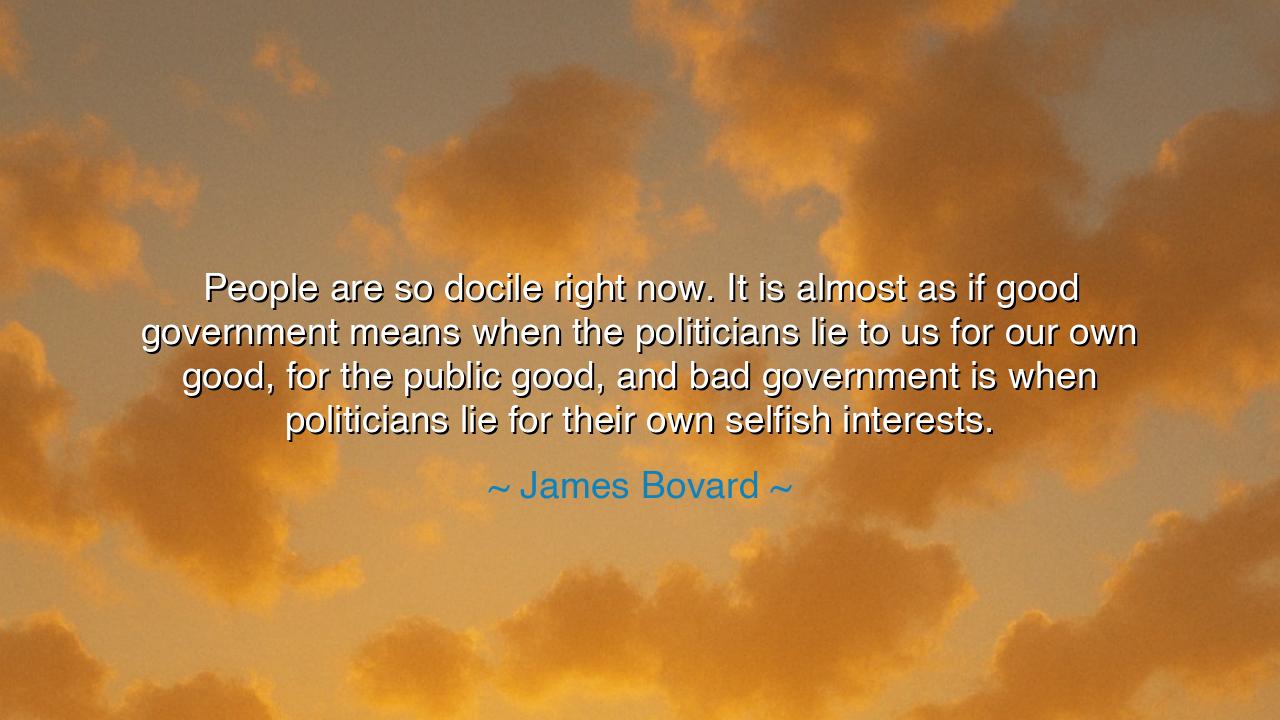
People are so docile right now. It is almost as if good
People are so docile right now. It is almost as if good government means when the politicians lie to us for our own good, for the public good, and bad government is when politicians lie for their own selfish interests.






"People are so docile right now. It is almost as if good government means when the politicians lie to us for our own good, for the public good, and bad government is when politicians lie for their own selfish interests." – James Bovard
In this sharp and unsettling reflection, James Bovard, the American libertarian thinker and critic of state power, exposes the complacency of the modern citizen and the slow moral decay that occurs when deception becomes acceptable. His words sting because they are true: when lies are dressed as benevolence, when manipulation is justified in the name of “public good,” a people forgets how to demand truth. Bovard’s statement is not merely political—it is moral and psychological. It is an indictment of societies that have grown comfortable with falsehoods, so long as they come wrapped in promises of safety, stability, or convenience.
The origin of this quote lies in Bovard’s long-standing criticism of the U.S. government’s tendency to conceal, distort, and justify policy failures in the name of patriotism or social welfare. His writings often highlight how governments, once trusted to protect, evolve into machines that govern by illusion—managing perception rather than reality. From the lies of war to the fabrications of economics, Bovard saw a dangerous pattern: people no longer demanded honesty, only reassurance. Thus, he laments, docility becomes the most dangerous form of submission—not forced by tyranny, but chosen through comfort.
At the heart of this quote lies a question as old as civilization itself: why do people tolerate deception from their rulers? In ancient times, kings ruled by divine right, and their words were considered sacred. But in democratic ages, when truth is supposed to belong to the people, lies take on a more insidious form. They are justified “for our own good.” The government lies about war “to protect morale,” about the economy “to prevent panic,” about surveillance “to preserve security.” Each lie may seem small, but together they weave a veil that blinds the public from reality. Bovard’s genius was in recognizing that the true corruption begins not when rulers lie, but when the people stop caring that they do.
History offers many witnesses to this tragedy. Consider the era of Soviet propaganda, where the state insisted that every act of repression, every famine, every censorship was done for the “good of the people.” Many citizens knew the truth, yet they chose silence, clinging to the illusion that obedience meant peace. Or think of the Watergate scandal, when the American people discovered that their president had lied to protect his own power. Outrage erupted—but for a moment only. In later years, scandals multiplied, yet outrage faded. The cycle repeated until the extraordinary became ordinary, and the citizen became numb. As Bovard warns, when deception ceases to offend, freedom begins to die quietly.
Bovard’s contrast between “good government” lies and “bad government” lies is deeply ironic. He mocks the moral relativism that infects modern politics—the belief that motives justify deceit. A government that lies “for the people’s sake” is praised as pragmatic, compassionate, even wise. But a government that lies for personal gain is condemned. Yet both are born from the same root: the belief that the people cannot handle the truth. Bovard calls out this hypocrisy, for in both cases, the citizen is treated as a child, not a sovereign. And when the governed accept such treatment, they cease to be free—they become wards of a paternal state.
What Bovard ultimately calls for is the resurrection of civic courage. A government’s power to deceive is limited only by the vigilance of its people. When the citizens are alert, questioning, and brave, falsehood cannot thrive. But when they are docile—lulled by comfort or fear—lies become law. Thus, the true danger lies not in corrupt leaders, but in complacent followers. Every society that values convenience over truth will awaken one day to find both gone.
The lesson, therefore, is as clear as it is eternal: truth is the foundation of freedom, and silence is its grave. When you excuse deception in the name of safety, you trade your birthright for illusion. A government that lies for your “own good” will soon decide what your good truly is.
And so, the practical actions are these: question authority, even when it claims to act in your favor. Demand transparency, not comfort. Refuse to let fear make you pliant. Defend truth in conversation, in media, in governance. Cultivate courage—not the loud defiance of the mob, but the quiet strength of conscience that cannot be bought or soothed by sweet lies. For as James Bovard warns, the greatest danger to liberty is not the tyrant with a whip, but the citizen who no longer minds being deceived.






AAdministratorAdministrator
Welcome, honored guests. Please leave a comment, we will respond soon